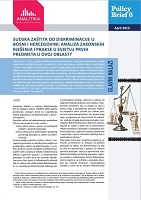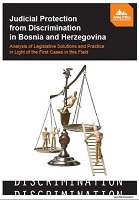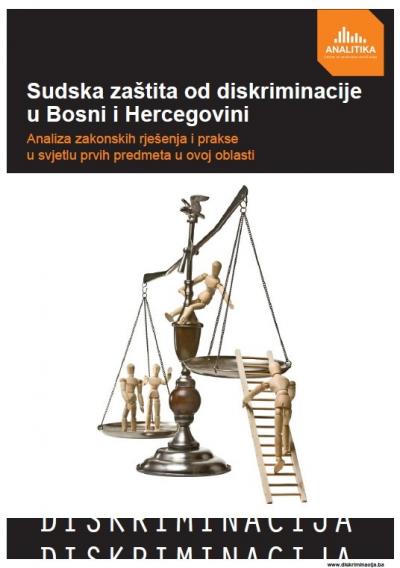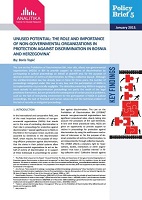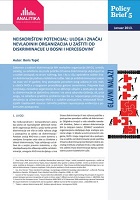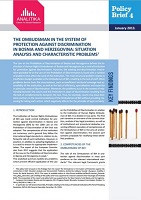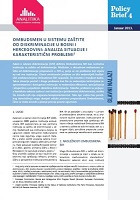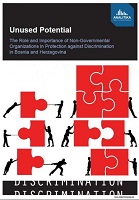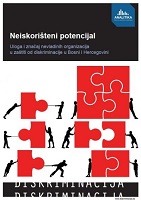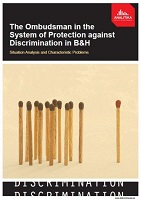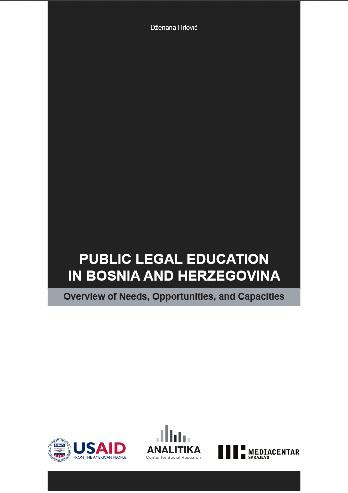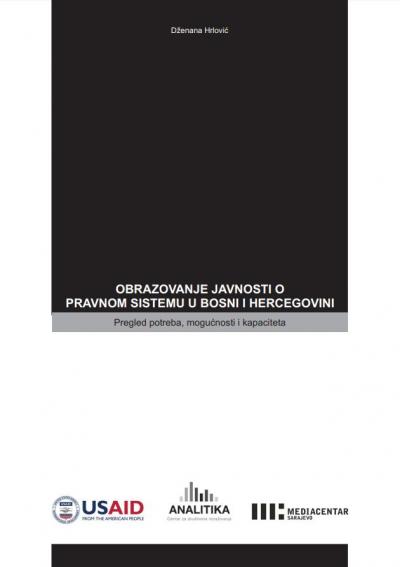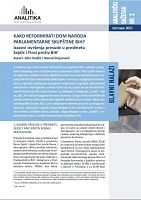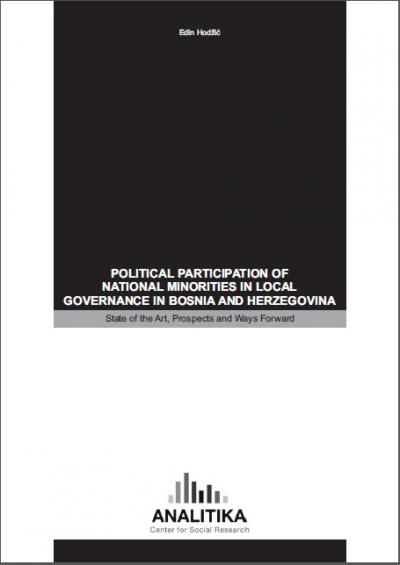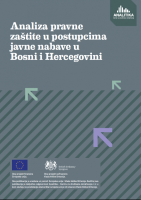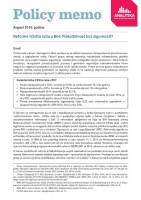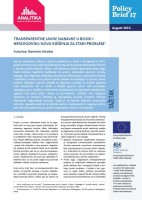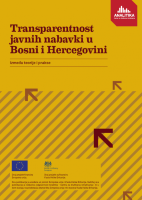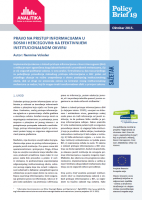Author(s): Dženana Hrlović / Language(s): English
A number of countries in the world have initiated various programs aimed at realization of public legal education (PLE), which may be defined as systemic and continuous dissemination of information about the legal system for purpose of better understanding thereof by the citizens, building confidence in justice institutions, and better coping by the citizens in the maze of legislation, rights, and responsibilities. Education of general public about the legal system offers potentially important contribution to addressing a number of societal problems, especially improvement of the status of various marginalized and vulnerable groups. Thus, for example, the report of the UN General Secretary for 2009 emphasizes the importance of legal education for the poor as one of the necessary conditions in order to create sustainable living and eradicate poverty. This study, completed in the period September – December 2011, confirms that there is considerable need for such educational programs in Bosnia and Herzegovina. Some of the fundamental reasons why PLE is especially relevant for Bosnia and Herzegovina (hereinafter BiH) are the post-conflict, transitional, and reform contexts marked by a myriad of new legal institutes and regulations, as well as the complicated network of judicial and other institutions, and often unclear competences at different levels of organization of the government in Bosnia and Herzegovina. Creating relevant programs for public legal education is especially important for young people who are usually not aware of the legislation that relates to them, or available mechanisms of exercising their rights. Research in other countries demonstrates that it is exactly the young people who are most likely to face a legal problem. In addition, it is important to keep in mind that organizing such programs is especially fitting for a group of young people, given the fact that the formal education system, encompassing the great majority of the young people, may be used for the purpose. The goal of this present research was to assess the nature and scope of current activities in public legal education, with special focus on the youth, as well as the needs and capacities for their development within the specific context of BiH. To that end, a comparative analysis of PLE programs was conducted, mainly based on secondary sources about the programs and activities in this field of public education in Bosnia and Herzegovina, countries of the region, Europe, and beyond. In that context, experiences from Canada, United States of America, and United Kingdom were especially important, for these are the countries where such programs are the most advanced. In addition, the data for assessment was collected through primary research, which included 14 interviews with the representatives of competent ministries and other governmental institutions, as well as international and domestic organizations dealing with these issues at least to a certain extent. With respect to the current situation in the PLE domain, the first thing to highlight is that most of the past efforts in Bosnia and Herzegovina have been directed towards education about human rights, with inconsequential engagement in awareness raising and providing information and knowledge on certain judicial institutions, their powers, and roles they play in the society, as well as the legal rights and responsibilities of citizens. The analysis shows that current efforts towards public legal education in BiH are also insufficient, and that Bosnia and Herzegovina is one of the countries where PLE programs are underdeveloped, though there are also substantial initiatives in this field. Some of the major problems in this domain are weak collaboration between key players, especially governmental and non-governmental sector, and the fact that projects in this area do not sufficiently encompass important aspects of the law and legal system, such as family law, employment and labor rights, social care rights, as well as available mechanisms for protection of rights. Another problem is presented by the lack of appropriate platforms for strategic partnerships between non-governmental sector and justice institutions and other governmental institutions in this area, as well as inadequate integration of PLE segments within the strategic documents of the justice sector and other sectors relevant to certain target groups (e.g. youth strategy at different levels of government). In addition to the above, another problem is presented by inadequate representation of the PLE in formal education, which lacks permanent institutional solution, continuity of education, and of educators in this field. Most of our interlocutors think that a significant problem is presented by the lack of financing or human resources for organization and coordination, as well as for the very implementation of activities aimed at public legal education and information. Implementation of such educational programs for general population is a complex task in any environment because it requires a larger number of participants and communication channels to encompass the broadest population possible. Nonetheless, according to relevant comparative experiences and available literature, in order to fulfill their purpose, PLE programs should reflect five key principles: accessibility (information should be written in plain language, and accessible to all, regardless of obstacles like cultural differences, life in isolated areas etc.), decentralization (forming of networks and partnerships among service providers in PLE at the level of the entire state improves efficiency and encompasses the majority of population), coordination, continuity, and sustainable financing. Of course, different target groups also lend themselves to different options for implementation of PLE programs. In that regard, it is estimated that these educational programs are especially easy to organize for a group of young people given their accessibility through educational institutions, as well as due to the fact that, because of their inexperience, they are exposed to additional risk. Options for development and institutionalization of PLE programs for youth are primarily identified in expansion of the existing PLE elements within the educational system (i.e. primarily civil education subjects) aiming to include as many young people as possible, and education in this field would be implemented even before they start encountering specific legal problems. In that context, it is especially important to address introduction of curriculum contents that develop competences, as well as creating interesting educational programs to entice the interest of this population. However, one should not neglect options for implementation of PLE programs for general population, such as the activities planned in various strategic documents of competent institutions, primarily those operating in the justice sector, or the potential in the domain of PLE offered by legal aid agencies, as well as the coordinated activities by non-governmental organizations. Some of the possible solutions include intensifying activities of relevant departments of various, primarily judicial institutions (e.g. public relations departments) in the domain of PLE or long-term PLE programs implemented through the media, as well as utilizing different educational mechanisms such as seminars, printed materials, free info lines etc. Examples of the best practice in the world have served us as a framework for the analysis, as well as the source of inspiration in formulating proposals for possible future steps in the domain of PLE in Bosnia and Herzegovina. Within such comparative framework, and based on the analysis of accessible sources and practices, as well as the assessment of needs and capacities for enhancement and institutionalization of PLE programs in Bosnia and Herzegovina, the following recommendations were formulated: 1. It is necessary to create an appropriate framework, i.e. strategic documents, for implementation of PLE in Bosnia and Herzegovina. They should adhere to and reflect the five key PLE principles identified, and they are as follows: accessibility, decentralization, coordination, continuity, and sustainable financing. 2. It is necessary to create detailed and long-term PLE programs for the youth in Bosnia and Herzegovina, with a broad scope of topics, and explore options for their institutionalization. An integral part those programs should include continuous evaluation systems, which would ensure that the contents correspond to expressed needs, as well as to changes in the legal system. 3. Necessary steps should be taken towards establishment of a network or partnerships between organizations and institutions that would take active part in implementation of PLE programs. 4. It is necessary to establish an appropriate resource center, where legal professionals, as well as trainers from other professions would be able to obtain required information, training, materials, and whatever they need to conduct various activities and PLE programs. 5. Scarcity of human capacities and resources for implementation of PLE programs could be overcome by establishment of institutional mechanisms to create incentives for legal professionals to volunteer in this field. Another possible solution is to focus the education on future trainers in this field, such as teachers in elementary and secondary schools, activists in various non-governmental organizations, or to engage a number of unemployed lawyers or law students from BiH universities on a voluntary basis in realization of PLE programs.
More...
